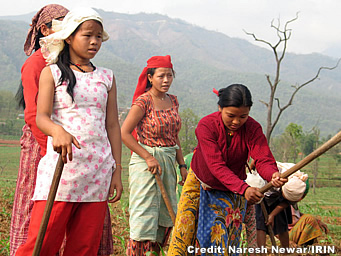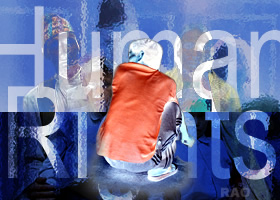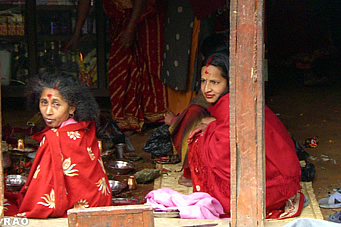 |
| Social Status of Women |
|
|
|
|
 |
|
 |
| Impoverished Nepalese girls tricked into prostitution |
 |
Traffickers target Nepalese girls from poor families in the villages
|
"There are so many innocent village girls who have been lured by traffickers with false promises of earning a lot of money in a foreign country," said Sushma.
Anti girl-trafficking activists have asked the local police authorities, especially those stationed near the open Nepal-Indian border, to be on the lookout for any young underage girls leaving the country.
In the last week alone a prominent local non-governmental organisation (NGO), Maiti Nepal, intercepted around 15 girls, half of whom were underage. "They were all carrying fake passports and didn't even know where they were travelling to," said activist Keshab Koirala from Maiti Nepal in Banke.
Maiti Nepal and other NGOs like the Women's Rehabilitation Centre are actively raising awareness of the dangers of trafficking but the traffickers can be persuasive: "I trusted the man who came to help me but I didn't know he was tricking me," said Fudoma Sherpa, a 15-year-old girl who was saved by Maiti Nepal at the border near Nepalgunj in Banke District. The alleged trafficker is in hiding, according to activists.
Despite measures by the government and NGOs to protect girls from being trafficked, the situation has barely changed, according to activists, who said hundreds of Nepalese girls still get trafficked to India every year where they are forced into prostitution.
NGOs suspect that one of the reasons for the steady number of trafficked girls is that mobility restrictions imposed by the recent armed conflict in Nepal now no longer exist. During that period young girls could not easily leave the villages due to the Maoist rebels who controlled the movement of people. The traffickers are able to exploit this situation, they say.
Particularly
vulnerable are girls who have become internally displaced persons (IDPs)
due to growing political violence in southern Nepal's densely populated
Terai region.
| How the traffickers operate |
 |
|
Young Nepalese girls are sold at a high price to the biggest brothel owners. One of the most notorious brothel owners was released a few years ago due to her political connections, which proved that traffickers get political protection, according to Maiti Nepal.
| Impoverished rural women prone to exploitation in towns |
| Maili
Buda, 35, is having an increasingly difficult life since her husband was
killed in Khalanga village, northwest of the capital, during a clash between
the Maoist rebels and government security forces nearly six years ago.
Peace has been restored in the country but many Nepalese women like Buda remain impoverished, say local aid workers. "Women continue to get poorer by the day and their hardship is compounded by the government's neglect," said local development worker Jiwan Khadga. |
 |
He said many impoverished women lost their male relatives during fighting with the Maoists or when they migrated to India to escape the turmoil. "A large number of them didn't return home. They stayed in India and some remarried, even when their wives were waiting for them."
Lack
of rights
"The worst off are women, and their impoverished situation is exacerbated by their lack of rights to own property and land," said Biswo Khadka, director of Maiti Nepal, a prominent organisation helping to protect impoverished women from being trafficked or forced into prostitution.
Girls
not spared by violence in Terai
Nepal
has introduced laws to ensure equal property rights for women but these
are not enforced in the villages.
"We will have to launch a massive campaign to persuade the government to give us its attention," said 36-year old Rabina Regmi, who was displaced from her home in the remote Ramechap District, nearly 200km east of the capital, after her husband was killed by Maoists.
Today she lives in abject poverty in the capital in a small one-room flat with her five children. Her relatives denied her the right to inherit her husband's property and literally forced her out of her house.
Exploited
If
the women try to find work in urban areas they can end up in very vulnerable
situations and either get underpaid or are sexually exploited, according
to Maiti Nepal. The fact that most are also illiterate or semi-literate
exacerbates the situation. Nearly 65 percent of Nepalese women are illiterate.
''Women
continue to get poorer by the day and their hardship is compounded by the
government's neglect.''
"I had no choice but to work in this dirty environment," said Rita Biswakarma, a 25-year-old waitress in a cabin restaurant, where she often has to endure sexual harassment and even have paid sex with customers. Many village girls working in Kathmandu are tricked into working as waitresses and then forced into providing sexual services.
Fighting between government troops and rebels forced Biswakarma and her two children to flee their village in the poverty-stricken Nuwakot District, about 100km north of Kathmandu, nearly two years ago. Her husband also fled.
Some of the poorest people live in remote hill and mountainous areas in the western part of the country, according to the UN's International Fund for Agricultural Development (IFAD). These areas have low rainfall, poor soil, and few roads or markets. Water supply, health, education and sanitation services are virtually non-existent, according to IFAD.
| Source:IRIN 2007 Copyright © UN Office for the Coordination of Humanitarian Affairs 2007 [ This report does not necessarily reflect the views of the United Nations] Integrated Regional Information Networks (IRIN), part of the UN Office for the Coordination of Humanitarian Affairs (OCHA). |
| more information |
|
| Links |
| External Links |
| UNFPA | OCHA | IRIN News |
|
Maiti Nepal Against traffiking |
|
|